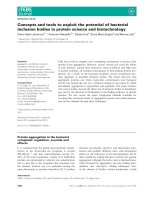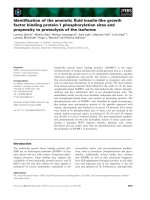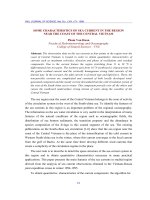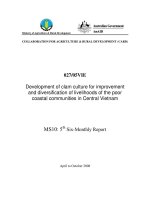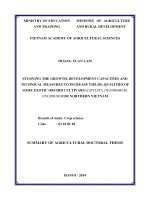Measures to exploit the potentials and advantages, and remove barriers to development of the central Vietnam key economic zone
Bạn đang xem bản rút gọn của tài liệu. Xem và tải ngay bản đầy đủ của tài liệu tại đây (12.97 MB, 6 trang )
Researches & discussions
Abstract
The central Vietnam Key economic Zone, with
its strategically important geographical position,
is considered as a zone of great potentials and advantages that will become a dynamic of socio-economic development of central Vietnam and
Western highlands. This article analyzes its potentials and advantages and identifies barriers to
the development of this economic zone, thereby
suggesting measures to the exploit such potentials
and advantages and remove barriers to the quick
and sustainable development of the whole zone.
The central Vietnam Key economic Zone
(hereafter referred to as cVKeZ), established
under PM Decision 1085/QĐ-TTg dated 12 aug.
2008, consists of five administrative units: Thừa
Thiên-huế, Đà nẵng, Quảng nam, Quảng ngãi,
and Bình Đònh. its area, 27,884 km2, accounts for
8.4% of the total area of Vietnam and its population of 6.5 million, accounts for 7% of the total
population of Vietnam. it has a string of seven big
cities: huế, Đà nẵng, hội an, Tam Kỳ, Vạn
Tường, Quảng ngãi and Quy nhơn. stretching
along a coastal line of 609 km are four developing
economic zones: chân Mây, chu Lai (an open economic zone), Dung Quất, and nhơn hội. Together
with this string of industrial zones, export processing zones in this area have the advantage of
* Dung Quất Vocational College of Technology
being near several seaports. The system of national and international warehouses here is to be
linked with international ports, and inter-regional
and trans-national communications networks.
This zone is also very important to national defense, orientation of socioeconomic development of
central Vietnam and Western highlands, and to
the socioeconomic development strategy of the
whole country as well. This key economic zone includes marine-based economy associated with industry and services. This zone would develop a
pivotal sub-zone that provides spaces for the development of marine-based economy, a coastal corridor for international economic free trade along
the national route 1a, the national railway line
and the system of seaports. in the development
strategy up to 2025, cVKeZ would become the impetus for the socioeconomic development in central Vietnam and Western highlands. it is also
the chief entrepôt point as well as the center for
trade and processing facilities in the greater
Mekong area and in the asia-Pacific rim.
1. Some assessments of the potential and advantage of CVKEZ
cVKeZ is on the north-south communications
line with national routes linking its seaports to
the Western highlands, Laos, northeastern cambodia, northeastern Thailand, and Myanmar
Economic Development Review - December 2010
19
Researches & discussions
to its numerous cultural heritage sites and historical relics as well as beautiful landscapes. it also
has four cultural heritages (material and non-material), one unesco-recognized biosphere reservoir (cù Lao chàm), a 609km-long coast with
various international-ranked beaches such as
Lăng cô (Thừa Thiên-huế, non nước (Đà nẵng),
Mỹ Khê (Quảng ngãi), and Quy nhơn, such islands as cù Lao chàm and Lý sơn are being
planned and developed into tourist and fishery logistics centers.
along the east West economic corridor (eWec)
and the inner Mekong area GMs. Lying in the
middle part of the country, cVKeZ has four airports and two international airports, Phú Bài and
Đà nẵng. Thanks to the system of seaports: chân
Mây, Liên chiểu, Tiên sa, Kỳ hà, Dung Quất, and
Quy nhơn ports, it has an advantage in developing marine-based economy, seaport-related services, international entrepôt services, and
production of seafood. Most of these ports are
deep-water ones able to receive ships with great
tonnage and not far from international waters and
thus, may help make cVKeZ an important international trading hub in the region and in the
world.
- The currently existing seaside economic zones
have created new motivations for the development
of four big centers of supporting industries: chân
Mây-Lăng cô (huế), chu Lai (Quảng nam), Dung
Quất (Quảng ngãi), and nhơn hội (Bình Đònh)
economic zones. cVKeZ also has a string of 24 industrial zones and export processing zones having
the advantage of being near the ports, systems of
national and international warehouses linked with
the general system of international seaports and
inter-regional and inter-national communications
lines.
- cVKeZ has the potential for developing
tourism with plentiful and diversified tours thanks
- The most precious asset and breakthrough
ability of central Vietnam are its people with
their diligence, intelligence, strong will power,
discipline, passion for work, and creativity. it is
predicted that, by 2025, the population of this area
would grow to 8.15 million, out of which 6 million
are in working age. This is a great advantage and
potential but it is necessary to have appropriate
policy to develop these advantage and potential
and thus, to form a basis for development of a
knowledge-based economy with increasingly high
added values. according to results of the research
and preliminary assessments of the Development
strategy study Project for Đà nẵng city and its
neighborhoods conducted in 2009 by the Japanese
international co-operation agency (Jica), basic
potentials and capacity of the provinces in cVKeZ
Table 1: Four-grade assessment of the advantages and capacity of provinces in CVKEZ
Advantages and potentials
Thừa Thiên- Huế
Đà Nẵng
Quảng Nam
Quảng Ngãi
Bình Đònh
B
(A)
C
B
C
(A)
A
(A)
A
A
3. Industrial advantage
B
B
(A)
(A)
B
4. Service advantage
A
(A)
C
A
B
5. Environmental economy
B
A
B
B
B
6. Human resource development
A
A
A
B
B
7. Environment management
A
A
B
(A)
(A)
8. Culture preservation
(A)
B
(A)
B
B
9. Urban development
(A)
(A)
(A)
(A)
(A)
10.Rural development
(A)
B
(A)
(A)
(A)
1. Key role
2. Tourist advantage
(Source: Japanese International Co-operation Agency JICA - 2009)
Notes: (A): outstanding advantage; A: advantage; B: average; C: under average
20
Economic Development Review - December 2010
Researches & discussions
are as follows:
“Thanks to relatively diverse and abundant
natural resources and great potentials in terms of
geographical position, natural resources, and manpower, cVKeZ has a very important position not
only to the orientation of socioeconomic development in central Vietnam but also to the development strategy of the whole country. in this key
zone, there has arisen a system of urban areas
spread equally over the territory and a system of
economic zones, industrial zones, and tourist service zones”, said Dr. nguyễn Bá Ân, Vice Director
of the institute of Development strategy.
“cVKeZ, an axis of sea-oriented economy with
modern and developed infrastructure, is the industrial backbone of the country. central Vietnam,
after establishing the axis of sea-oriented economy, has had unequal developments and breakthroughs ever happened before. cVKeZ is now
developing and growing into a powerful sea-oriented economy in the whole country,” said Dr.
Trương Đình hiển, a senior researcher at the
Forum “central Vietnam Key economic Zone new opportunity for Prosperity” in March 2010,
Quảng ngãi province.
2. Some barriers to the development of CVKEZ
Besides the above-mentioned potentials and
advantages, cVKeZ is now meeting with some
subjective and objective barriers as follows:
- cVKeZ lies in the area where natural disasters, storms, and floods often attack and its infrastructure, in general, is not yet developed.
- compared with other areas in the country,
cVKeZ is a poor one; per capita GDP is only
68.4% of the national average. only Đà nẵng
province is able to balance its budget and the
other four provinces still have to get support from
the national budget (Quảng ngãi province, thanks
to the rapid development of the Dung Quất economic zone, would be able to balance its own
budget in a few years). cVKeZ has a poor investment climate and foreign-invested projects (FDi)
there only accounts for 4.9% of the total foreigninvested projects in the country (source: Foreign
investment agency - Ministry of Planning and investment -2007). if this keeps going on, it would
be evident that the objective of developing cVKeZ
into a nucleus for the socioeconomic development
of central Vietnam and the Western highlands
would be very hard to achieve.
- Localities in cVKeZ have the same conditions for development and the same economic
structures (excluding Đà nẵng with fairly developed manufacturing and service sectors). They all
have seaports and airports (Quảng nam and
Quảng ngãi shared the chu Lai airport). Therefore, if each province make its own economic development plan, unnecessary competition between
them for investment and in growth target would
be very great. There still exists in cVKeZ such
barriers as the thinking way originated from a
closed and small economy, the way of doing business is still trivial and petty; for example, all
provinces want to have their own sugar factory or
university, etc.
- unlike other key economic zones in north
and south Vietnam, cVKeZ has a big problem
with its human resource. in recent years, this resource has developed remarkably but in order to
ensure a rapid and sustainable development, the
cVKeZ is caught in a dilemma: surplus of untrained labor and shortage of well-trained one.
currently, in cVKeZ there are a very few research institutes and centers and the training system is not strong enough. When big projects are
developed, they always face a great shortage of
workers, especially the ones trained in professions
they need in terms of both quantity and quality.
The fact that bosses outnumber workers and enterprises are “thirsty” for trained workers is a reality that could be seen in almost all industrial,
economic, and export processing zones resulting
in difficulties in production and service of enterprises. an example is the French Technip Technical contractor Group. When this group started
installing equipment in the Dung Quất oil refinery, it found out that it could not find a local-based
technical welder able to perform high pressure
welding. instead, it had to hire welders from
Malaysia, Thailand, and india to insure the speed
of progress and at the same time, it helped Quảng
ngãi authorities build a training center for highquality technical welders for Dung Quất oil refin-
Economic Development Review - December 2010
21
Researches & discussions
ery.
- in cVKeZ, such services as finance, banking,
education, and technological- scientific research
are poorly developed. share of foreign trade in
local gross output is also low and entrepoât business is still a potential. This shows that the role
of cVKeZ central cities has not reached their potentials as nuclei of growth. Financial and banking activities of cities and provinces are usually
got done in hcMc.
- sectionalism is also a big barrier to cooperation and development and it is necessary to get
rid of it. so far, provinces in cVKeZ have operated independently without cooperation or mutual
support though this is a very important way of implementing the development strategy of cVKeZ.
education and training are the fields where cooperation is very easy but, in reality, each province
has at least two universities and many training
facilities and they fail to establish constant and
sustainable cooperation. in order to figure out solutions to the development of cVKeZ, universities
and research institutes have held various seminars, workshops, and forums on investment promotion and cooperation for development. Findings
of all these conferences and forums show that the
conclusions reached at these events are only about
the recognition of the problems and do not point
out specific action plans to tap the potentials of
cVKeZ. For example, the plan to build an information center for human resource, one of the
most important solutions suggested by the conference on “Development of the Workforce via Professional Training to Meet the requirements of
enterprises in cVKeZ” held on Dec. 12, 2008, by
The Directory office for the Development coordination between Key economic Zones and by Ñaø
naüng coordination Team and the General Vocational Training office, has not been carried out
yet.
3. Measures to exploit the potentials and advantages and deal with barriers to CVKEZ development
Based on the assessments and the factual situation of cVKeZ, we would like to propose some
solutions to its development:
22
Economic Development Review - December 2010
a. Development of the human resource for
manufacturing and service sectors in CVKEZ:
in order to develop, an economy requires the
following resources: capital, technology, natural
resources, and human resource. in order to grow
quickly and consistently, an economy also needs
three basic factors: applying new technology, developing modern infrastructure, and improving
the human resource. Developing the human resource is the key to dealing with such difficulties
as efficiency, equality, stability, and growth. Being
aware of the decisive role of the human resource
among other resources, the cPV has pointed out
“The human resource is the most precious resource
playing a decisive role in the development of the
country, especially when financial and material resources are still limited.” in cVKeZ, most laborers engage in agricultural production. in the
process of modernization and industrialization,
millions of farmers need training to change jobs,
especially those who lost farming land when the
government took it back to set up industrial and
economic zones. These farmers would become a
big pressure in professional education in the coming days. Therefore, it is necessary to take the following measures to develop the human resource to
meet the requirement of the development of industry and service in cVKeZ:
- Forecasting and assessing the need for
human resources: it is necessary to examine and
assess the human resources in terms of quality,
quantity and occupation structure. Particularly, attention must be paid to the fact that currently
skillful and professional workers are in great
shortage. it is necessary to assess this need at
present and in the near future (5-7 years) as well
to work out a plan to train laborers in skills
needed for the future. The forecast and assessment will allow us to identify characteristics of the
human resources affecting directly the quality and
effectiveness of production and service along with
other factors affecting the socioeconomic development for the human resource.
- Planning the network of training facilities:
This plan should aim at improving the training effectiveness and supplying an army of laborers
Researches & discussions
meeting requirements of the economic growth in
terms of quantity, quality, and occupation structure. in order to achieve this goal, the network of
training facilities should be planned under the following principles: this network should be in accordance with the local socioeconomic development
strategy and with the scope of public and private
investments. it should provide conditions for
everyone to participate in the building of training
facilities. it should also satisfy the need for human
resources of enterprises and the need for education of the public, especially a great number of
those who need to change jobs due to the fact that
they have lost their land when the government
confiscates it for other projects.
- Big universities like Đà nẵng and huế universities should play the central “spillover effect”
role in order to become the “guide” for the reform
and help other training facilities train laborers to
meet requirements of enterprises. Training facilities in cVKeZ should carry out the task of specialization,
allocation,
cooperation,
supplementation, and support in view of teachers,
programs, textbooks, and scientific researches.
The most important thing is to improve the cooperation between training facilities and enterprises
in designing and executing training programs,
evaluating the training quality, and employing laborers after training to adjust training objectives
to requirements of enterprises.
- setting up the network of scientific research
facilities in cVKeZ to study key problems about
the socioeconomic development of cVKeZ (development strategy, planning, labor market information, pollution, environment protection, water
supply, energy, agriculture, forestry, and fishery).
- People in central Vietnam still want their
children to go to college or university rather than
attending vocational or technical high schools,
which leads to a situation in which “bosses outnumber workers” and graduates from colleges or
universities are forced to do jobs of plain workers.
The inadequacy in labor division is a great waste
of time and expenses of the trainees. Therefore,
the government and training facilities should have
policy and mechanism for job orientation to help
high school graduates to choose the right educational or training organizations. Government and
training facilities should also cooperate in training, standardizing the army of teachers, ensuring
the quality of training, and giving incentives to
both teachers and students in forms of salary,
bonus, scholarship, and education allowances.
b. Investment in infrastructure:
- continuing to examine and assess the communications network in the whole cVKeZ in
order to make new plans appropriate to the
process of socioeconomic development.
- increasing investment in the infrastructure
and making the technical infrastructure appropriate to social structure are effective ways of improving the quality of the system of the necessary
infrastructures for the sake of the economic development, social welfare, and sustainable development. in particular, it is necessary to give priority
to the completion of highways along the seaside
from Đà nẵng to hội an and chu Lai open economic zone, and from Dung Quất to sa huỳnh. it
is also necessary to upgrade Tiên sa, Liên chiểu,
chân Mây, and Quy nhơn seaports and invest in
the upgrading of chu Lai airport to meet the requirement of communicating in the area as well
as to upgrade and expand Đà nẵng airport to develop it into an international airport of the central Vietnam.
c. Cooperation of provinces for common
development:
cooperation of the five provinces and cities in
cVKeZ would bring about benefits for all sides involved because it helps increase local ability to tap
existing potentials, thereby saving expenses due
to the reduction in competition costs and improving the competitiveness of the whole zone via coordination of specific advantages of each province,
economies of scale, better labor division and specialization, and reduced risk based on joint responsibility.
in order to enhance the advantages of cVKeZ
and ensure a sustainable development of cVKeZ,
it is necessary for the provinces and cities to increase and expand cooperation in investment in
order to improve the quality of the inter-regional
Economic Development Review - December 2010
23
Researches & discussions
infrastructure, expand the ability of getting access
to the markets, speed up the development of supporting industries, build tourism centers and systems of tours and services along the route of the
world cultural heritages, and cooperate with other
parties involved to make the most of the eastWest corridor in order to exploit transportation
services along this corridor. More importantly,
this cooperation should be carried out in a professional and sustainable way to actually create a
strong advantage for the whole area.
- it is necessary to set up an organization in
charge of a mechanism that would insure the cooperation between the five provinces and cities in
cVKeZ for development. This organization would
coordinate efforts of the provinces and cities for
the development of the inter-regional key infrastructures and exploit the potentials and advantages of the area such as seaports, airports,
cultural heritages, historic sites, road network,
railway, electricity, telecommunications, waste
disposal, and environment, etc.
4. Conclusion
in order to carry out the development strategy
to 2025 to make cVKeZ a dynamic of the socioeconomic development of the central Vietnam and
Western highlands and an entrepôt as well as a
trading and processing center of the greater
Mekong Delta and asia-Pacific rim, it is necessary
for cVKeZ to mobilize human resource, capital,
and technology to overcome the barriers and to exploit well its potentials and advantages for the
quick and sustainable development. The key to the
success of the whole cVKeZ depends on the concurrence, determination and practical action of the
24
Economic Development Review - December 2010
concerning agencies from the local authorities to
the central governmentn
References
1. Decision No 1085/QĐ-TTg dated Aug. 12, 2008
2. Nguyễn Minh Đường (2002), Nghiên cứu phát triển
nguồn nhân lực với phương pháp tiếp cận hệ thống trong
điều kiện mới (Study on development of the human resources via system- approach method in new conditions)
Khoa học Xã hội Publishing House, Hà Nội.
3. Nguyễn Lộc (2010), “Một số vấn đề lí luận về phát
triển nguồn nhân lực” (Some theoretical arguments on
the development of the human resource), Khoa học giáo
dục 56, May 2010.
4. Phạm Minh Hạc (2007), Phát triển văn hoá con
người và nguồn nhân lực thời kỳ Công nghiệp hoá, Hiện
đại hoá đất nước (Developing the human culture and resources in the era of industrialisation and modernization),
Chính trò Quốc gia Publishing House, Hà Nội.
5. “Hội nghò nguồn nhân lực cho sự phát triển Khu
Kinh tế Dung Quất trong thời kỳ hội nhập” (Proceedings
of Conference on the Human Resources for the Development of Dung Quất Economic Zone in the Period of Integration) October 2008.
6. “Diễn đàn Thương hiệu biển Việt Nam lần thứ II –
Từ cảng nước sâu tới Khu Kinh tế biển” (Proceedings of
the Second Forum on Vietnam Sea Trade Name- From
Deep-Water Ports to Marine-Based Economics jointly
held by Ministry of Natural Resources & Environment,
Ministry of Planning and Investment, and Quảng Ngãi
Provincial People’s Committee) March 2010.
7. “Diễn đàn Hợp tác Vùng Kinh tế trọng điểm miền
Trung-Vận hội mới cho sự thònh vượng” (Proceedings of
Forum on the Cooperation in the Central Vietnam Key
Economic Zone- New Opportunity for Prosperity) March
2010.



